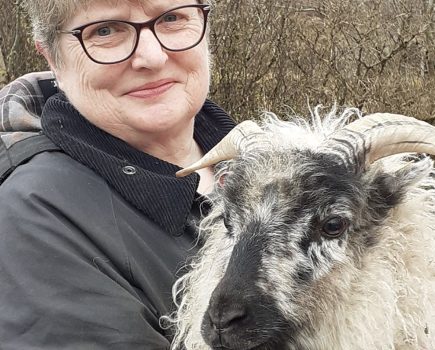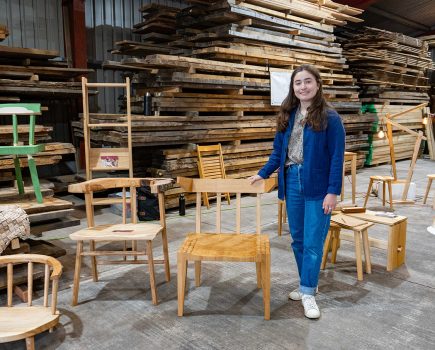Shann Jones used to live in San Francisco and was a talk show host on an American radio station. Now she runs a goat farm in Wales and is one of the few people producing unpasteurised milk and products for direct sale to customers. She talked to Anke Sieker
Shann Jones used to live in San Francisco and was a talk show host on an American radio station. Now she runs a goat farm in Wales and is one of the few people producing unpasteurised milk and products for direct sale to customers. She talked to Anke Sieker How did it all start? You can probably re-phrase my journey to the Welsh coast in the following sentence: How an American Career Girl Who Couldn’t Boil an Egg Finally Found True Love and Happiness on a Welsh Goat Farm. I was a radio talk show host in San Francisco – an American career girl in the city. I lived in a high-rise apartment, had a maid to clean my flat and a fridge full of ready meals. I had never touched a farm animal or milked a goat in my life…and had no desire to learn! But then I came to Wales, and fell in love with Rich, a Welsh harp maker and farmer. We got married and I moved with my two children onto his sustainable family farm overlooking the Irish Sea. And the goats…? My little boy Benji had horrible bronchial infections, and Rich suggested that we get a goat, because Welsh farming tradition holds that goat’s milk is good for asthma. One goat turned to four, and then to 10. Benji’s asthma disappeared. I went online looking for something to do with all the leftover goat’s milk, and found a website that showed me how to make goat’s milk soap. The handmade soap I made rapidly cleared Benji’s eczema. We knew we were onto something! So a business idea was hatched…? Other mums on the school run noticed, and started asking us for our goat’s milk products to help their own children’s asthma and eczema. We launched our little business, Chuckling Goat, in the spring of 2011, selling raw goat’s milk, goat’s milk soap and skin cream, as well as a powerful probiotic drink called kefir. All of our products are made by hand, in small batches, here on the farm. Prince Charles’ company, Cambrian Mountains, asked us to make soap for them after the Daily Mail awarded our soap 9 out of 10. The next year, Rich went into hospital for a major operation. He came out with a 10ins abdominal incision that was infected with MRSA. He was so ill that we feared for his life. Janey Lee Grace, BBC Radio 2 presenter and natural product expert, had given our kefir her 2012 Platinum Award, and suggested that I use it in soap. I remembered her suggestion – and used our kefir probiotic on Rich’s skin. Two weeks later, he swabbed clear of MRSA. It has never returned. Today Rich is completely healed, healthy and back on his tractor. And Fortnum and Mason is now planning an exclusive launch of our brand new probiotic skincare line that we developed as a result of our battle with MRSA. Your business emphasis is on raw milk – what’s so special about unpasteurised? Pasteurisation was developed at a time when (undiagnosed) bovine tuberculosis was readily transmitted from cows to humans through drinking of fresh milk. It was also before highly efficient methods for the cooling and freezing of milk and its subsequent transport were available. Pasteurisation just gave a longer safety margin before consumers in towns and cities bought the milk. However, pasteurisation not only kills bad microbes and bacteria, but ALL of them. It could be argued that this reduces milk to nothing more than white water with some fat, proteins and calcium in it. Fresh raw milk (and yoghurt, kefir and cheese) is very healthy for humans of all ages! Living in Scotland, the selling of raw goat’s milk for human consumption is a complete no-no for me, but you can do it in the rest of the UK. How have you managed to get environmental health and food hygiene inspectors on your side? We did some research, found our local food hygiene inspector and invited him to come round. We asked his advice while we were still thinking about our new venture and were in the process of setting up. Because we took each step in co-operation with the authorities, we were able to avoid making expensive mistakes! What are the regular checks your farm has to undergo? We are subject both to regular inspection by animal health and environmental health officials as well as spot checks where they inspect the barns, paperwork and come and take a sample of the milk for microbial testing. We also do voluntary yearly testing for TB and CAE which is over and above the legal requirement, and pay for this ourselves. We also do have the milk tested at the public microbiological labs, which is again paid for by us. My attitude is rather too much testing than too little! We are certified as TB and Brucellosis-free. (The whole of the UK is free of Brucellosis – but DEFRA undertakes regular spot checks (blood tests) on randomly selected herds to submit data to the EU in order to maintain the Brucellosis-free status) Given that the days of milk churns waiting on the side of the road to be picked up by the local dairy for bottling and delivery to the nearest town are now in the distant past, how do you get your raw milk to your customers? Our products are shipped frozen, in special boxes with polystyrene inserts and frozen gel packs to keep everything cool, by 24 hour courier. We ship anywhere in the UK. Our website is the easiest way to order, www.chucklinggoat.co.uk. Full-fat goat’s milk freezes readily and without separation on thawing out, as the fat globules are much smaller compared to cow’s milk and stay much more readily suspended in the liquid rather than floating to the top. So what else goes on at your farm? As much as possible, at Chuckling Goat we try to create a self-sustaining eco-system. Although we are not certified organic, we are completely chemical-free. Muck from the goats’ barn is spread onto our ancient, multi-species wildflower hay meadows, allowed to grow naturally in its own time, and then Rich mows and bales it into conventional small-bale hay, with the help of his treasured vintage tractors. We use this lovely chemical-free hay and haylage to sustain the goats over the winter months, because, although they don’t mind the cold, they do hate going out in the rain! The goats also eat GM-free, soya-free feed that we have specially made up for us. Rich is also kept busy with daily maintenance on the farm, keeping the fences tidy, and managing our 3.5 acres of woodlands where the goats free range, as of course their preferred food is leaf browsing and not grass grazing. So, for us, it’s mostly about the goats, and we have cats too. We do occasionally rear some other stock for our own consumption, but really it’s all about the goats… THE RULESIn England and Wales the sale of raw (cow’s, goat’s and sheep’s) milk is allowed under certain conditions. There have been several risk assessments carried out by the government in recent years, but so far common sense has prevailed south of the border. Further information can be found on the following website: http://www.food.gov.uk/business-industry/guidancenotes/dairy-guidance/rawmilkcream#Currentcontrols:EnglandandWales In 2004, Scottish ministers not only maintained the existing ban on the sale of cow’s milk, but extended it so that ALL raw drinking milk and cream sales in Scotland would be prohibited. PHOTO: Shann Jones with her daughter Jolian and their pedigree Anglo Nubian goats







